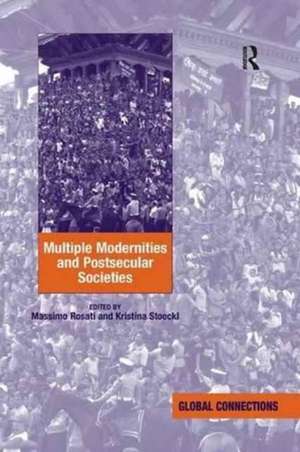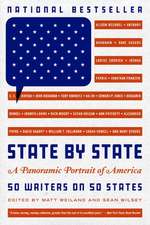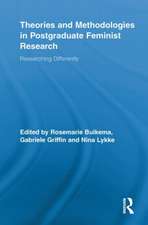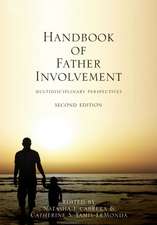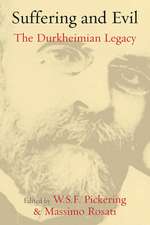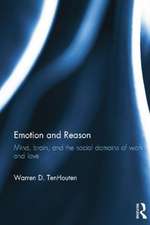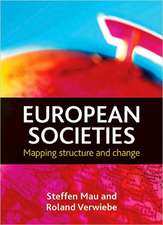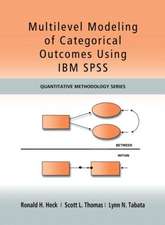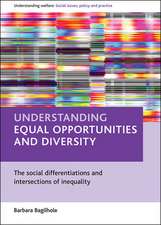Multiple Modernities and Postsecular Societies
Autor Kristina Stoeckl Editat de Massimo Rosatien Limba Engleză Paperback – 15 noi 2016
| Toate formatele și edițiile | Preț | Express |
|---|---|---|
| Paperback (1) | 469.34 lei 6-8 săpt. | |
| Taylor & Francis – 15 noi 2016 | 469.34 lei 6-8 săpt. | |
| Hardback (1) | 1057.40 lei 6-8 săpt. | |
| Taylor & Francis – 10 dec 2012 | 1057.40 lei 6-8 săpt. |
Preț: 469.34 lei
Nou
Puncte Express: 704
Preț estimativ în valută:
89.81€ • 93.96$ • 74.60£
89.81€ • 93.96$ • 74.60£
Carte tipărită la comandă
Livrare economică 02-16 aprilie
Preluare comenzi: 021 569.72.76
Specificații
ISBN-13: 9781138261815
ISBN-10: 1138261815
Pagini: 200
Dimensiuni: 156 x 234 mm
Greutate: 0.45 kg
Ediția:1
Editura: Taylor & Francis
Colecția Routledge
Locul publicării:Oxford, United Kingdom
ISBN-10: 1138261815
Pagini: 200
Dimensiuni: 156 x 234 mm
Greutate: 0.45 kg
Ediția:1
Editura: Taylor & Francis
Colecția Routledge
Locul publicării:Oxford, United Kingdom
Notă biografică
Massimo Rosati is Director of the Centre for the Study and Documentation of Religions and Political Institutions in Post-Secular Society and teaches sociology at the University of Rome Tor Vergata, Italy. He is author of Ritual and the Sacred and co-editor of Suffering and Evil. Kristina Stoeckl is APART Postdoctoral Research Fellow at the University of Vienna and author of Community after Totalitarianism.
Recenzii
’Querying our understanding of secular, modern culture in the light of contemporary religious resurgence, this book contends that the Western model of modernization, according to which secular culture replaces religion, is not applicable to most of humanity. Opting instead for the idea of multiple modernities, or different patterns of modernization in different places, the authors suggest that developments in non-Western cultures might augur what will happen in the West, with postsecular societies experiencing religious pluralism, and religion perhaps acting as a driving force towards modernization in some societies. A wide-ranging and thorough collection, this book is at the forefront of literature on this topic, challenging readers with its analysis and depiction of the many transfers between religion and secularization. These essays will drive scholars to reformulate and refine their theories of secularization.’ Gabriel Motzkin, The Van Leer Jerusalem Institute 'I learned a good deal from reading this collection, most of it about the societies revealed in the case studies. The complexities and intricacies of these studies, and the tangled relations between religion and politics that exist within the societies studied, make vivid the truth that the realities of modernization are far too multifarious to be easily captured by any theoretical framework.' Journal of Church and State
Cuprins
Introduction, Massimo Rosati, Kristina Stoeckl; Chapter 1 From Multiple Modernities to Multiple Democracies, Alessandro Ferrara; Chapter 2 Multifaceted or Fragmented Public Spheres in Turkey and Iran, U?ur Kömeço?lu; Chapter 3 The Turkish Laboratory: Local Modernity and the Postsecular in Turkey, Massimo Rosati; Chapter 4 Russia’s ‘Cursed Issues’, Post-Soviet Religion, and the Endurance of Secular Modernity, Alexander Agadjanian; Chapter 5 European Integration and Russian Orthodoxy: Two Multiple Modernities Perspectives, Kristina Stoeckl; Chapter 6 A State Goddess in the New Secular Nepal: Reflections on the Kumari Case at the Supreme Court, Chiara Letizia; Chapter 7 Big Man of the Big God: Nigeria as a Laboratory for Multiple Modernities, Enzo Pace; Chapter 8 The Modernity of New Societies: South Africa, Brazil and the Prospect of a World-Sociology, Peter Wagner;
Descriere
Engaging with the idea that the world reveals not one, but many routes to modernity, this volume explores the role of religion in the emergence of multiple forms of modernity, which evolve according to specific cultural conditions and interpretations of the 'modern project'. Drawing upon case study material from Africa, The Middle East, Russia and South America, it examines the question of whether modernity, democracy and secularism are universalistic concepts or are, on the contrary, unique to Western civilization, whilst considering the relationship of postsecularism to the varied paths of modern development.
